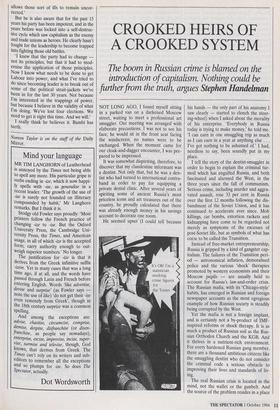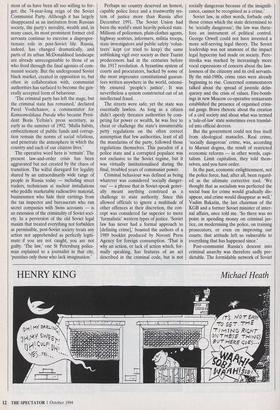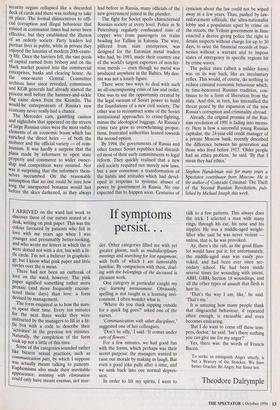CROOKED HEIRS OF A CROOKED SYSTEM
The boom in Russian crime is blamed on the introduction of capitalism. Nothing could be
further from the truth, argues Stephen Handelman NOT LONG AGO, I found myself sitting in a parked van on a darkened Moscow street, waiting to meet a professional art smuggler. Our meeting was arranged with elaborate precautions. I was not to see his face; he would sit in the front seat facing the windscreen; no names were to be exchanged. When the moment came for our cloak-and-dagger encounter, I was pre- pared to be impressed. It was somewhat dispiriting, therefore, to discover that my clandestine informant was a dentist. Not only that, but he was a den- tist who had turned to international contra- band in order to pay for equipping a private dental clinic. After several years of spiriting some of ancient Russia's most priceless icons and art treasures out of the country, he proudly calculated that there was already enough money in his savings account to decorate one room.
He seemed upset (I could tell because his hands — the only part of his anatomy I saw clearly — started to clench the steer- ing-wheel) when I asked about the morality of his enterprise. 'Everybody in Russia today is trying to make money,' he told me. `I can earn in one smuggling trip as much as I can earn in a year at anything else . . . I've got nothing to be ashamed of.' I had, needless to say, been soundly put in my place.
I tell the story of the dentist-smuggler in order to begin to explain the criminal tur- moil which has engulfed Russia, and both fascinated and alarmed the West, in the three years since the fall of communism. Serious crime, including murder and aggra- vated assault, rose 33 per cent in Russia over the first 12 months following the dis- bandment of the Soviet Union, and it has continued to accelerate ever since. Mob killings, car bombs, extortion rackets and kidnapping have come to be regarded not merely as symptoms of the excesses of post-Soviet life, but as symbols of what has come to be called the Transition.
Instead of free-market entrepreneurship, Russia is gripped by a kind of gangster cap- italism. The failures of the Transition peri- od — astronomical inflation, demoralised police and the various 'shock' therapies promoted by western economists and their Moscow pupils — are usually held to account for Russia's law-and-order crisis. The Russian mafia, with its 'Chicago-style' habits, has emerged in Russian and foreign newspaper accounts as the most egregious example of how Russian society is steadily being corrupted by the West.
Yet the mafia is not a foreign implant, and is certainly not a by-product of IMF- inspired reforms or shock therapy. It is as much a product of Russian soil as the Rus- sian Orthodox Church and the KGB. And it thrives in a nutrient-rich environment. For every hardened Russian gang member, there are a thousand ambitious citizens like the smuggling dentist who do not consider the criminal code a serious obstacle to improving their lives and standards of liv- ing.
The real Russian crisis is located in the mind, not the wallet or the gunbelt. And the source of the problem resides in a place most of us have been all too willing to for- get: the 74-year-long reign of the Soviet Communist Party. Although it has largely disappeared as an institution from Russian society, the party's morality, wealth and, in many cases, its most prominent former civil servants continue to exercise a dispropor- tionate role in post-Soviet life. Russia, indeed, has changed dramatically, and parts of its urban McDonaldised landscape are already unrecognisable to those of us who lived through the final agonies of com- munist society. But the underground Soviet black market, created in opposition to, but often in collaboration with, communist authorities has surfaced to become the gen- erally accepted form of behaviour.
`The criminal party has left the stage, but the criminal state has remained,' declared Pavel Voshchanov, a commentator for Komsomolskaya Pravda who became Presi- dent Boris Yeltsin's press secretary, as early as the summer of 1992. 'Mafia habits, embezzlement of public funds and corrup- tion remain the norms of social relations, and penetrate the atmosphere in which the country and each of our citizens lives.'
The operative word here is 'remain'. The present law-and-order crisis has been aggravated but not created by the chaos of transition. The wilful disregard for legality shared by an extraordinarily wide range of people in Russia today — including street traders, technicians at nuclear installations who peddle marketable radioactive material, businessmen who hide their earnings from the tax inspector and bureaucrats who run secret companies with Swiss accounts — is an extension of the criminality of Soviet soci- ety. In a perversion of the old Soviet legal maxim that treated everything not forbidden as permissible, post-Soviet society treats any action not apprehended as perfectly legiti- mate: if you are not caught, you are not guilty. 'The law,' one St Petersburg police- man explained to a journalist in that city, `punishes only those who lack imagination.' Perhaps no country deserved an honest, capable police force and a trustworthy sys- tem of justice more than Russia after December 1991. The Soviet Union had been the world's most heavily policed state. Millions of policemen, plain-clothes agents, highway sentries, informers, militia troops, state investigators and public safety 'volun- teers' kept (or tried to keep) the same unblinking vigil over society as their Tsarist predecessors had in the centuries before the 1917 revolution. A byzantine system of courts and procurators, backed by some of the most impressive constitutional guaran- tees written anywhere in the world, ostensi- bly ensured 'people's justice'. It was nevertheless a system constructed out of an intellectual fraud.
The streets were safe; yet the state was essentially lawless. As long as a citizen didn't openly threaten authorities by com- peting for power or wealth, he was free to cheat or challenge the state's innumerable petty regulations on the often correct assumption that few authorities, least of all the mandarins of the party, followed those regulations themselves. This paradox of a police state and a corrupted populace was not exclusive to the Soviet regime, but it was virtually institutionalised during the final, troubled years of communist power.
Criminal behaviour was defined as being whatever was considered 'socially danger- ous' — a phrase that in Soviet-speak gener- ally meant anything construed as a challenge to state authority. Since this allowed officials to ignore a multitude of other offences at their discretion, the con- cept was considered far superior to more `formalistic' western types of justice. 'Soviet law has never had a formal approach to [defining crime],' boasted the authors of a 1989 booklet produced by Novosti Press Agency for foreign consumption. 'That is why an action, or lack of action which, for- mally speaking, has features of an act described in the criminal code, but is not socially dangerous because of the insignifi- cance, cannot be recognised as a crime.'
Soviet law, in other words, forbade only those crimes which the state determined to be 'socially dangerous'; the law was there- fore an instrument of political control. George Orwell could not have invented a more self-serving legal theory. The Soviet leadership was not unaware of the impact legal hypocrisy had made on society. Pere- stroika was marked by increasingly more vocal expressions of concern about the law- lessness of the citizenry and its civil servants. By the mid-1980s, crime rates were already beginning to rise. Concerned commentators talked about the spread of juvenile delin- quency and the crisis of values. Fire-bomb- ings in new Moscow co-operative restaurants established the presence of organised crimi- nal gangs. Brave rhetoric about the creation of a civil society and about what was termed a 'rule-of-law' state sometimes even translat- ed into official decrees.
But the government could not free itself from ideological manacles. Real crime, `socially dangerous' crime, was, according to Marxist dogma, the result of restricted economic reforms — in other words, capi- talism. Limit capitalism, they told them- selves, and you have order.
In the past, economic enlightenment, not the police force, had, after all, been regard- ed as the ultimate corrective tool. 'We thought that as socialism was perfected the social base for crime would gradually dis- appear, and crime would disappear as well,' Vadim Bakatin, the last chairman of the KGB and a former Soviet minister of inter- nal affairs, once told me. 'So there was no point in spending money on criminal jus- tice, on modernising the police, on training prosecutors, or even on improving our courts; that attitude left us vulnerable to everything that has happened since.'
Post-communist Russia's descent into criminal anarchy was therefore sadly pre- dictable. The formidable network of Soviet security organs collapsed like a discarded deck of cards and there was nothing to take its place. The formal disincentives to offi- cial corruption and illegal behaviour that existed in communist times had never been effective, but they established the illusion of an orderly society. Party leaders led puritan lives in public, while in private they enjoyed the luxuries of modern 20th-centu- ry life. Once the barriers fell, the vast pools of capital earned from bribery and on the black market poured into the commercial enterprises, banks and clearing house. As the once-secret Central Committee archives have since revealed, commissars and KGB generals had already started the process well before the hammer-and-sickle flag came down from the Kremlin. The would-be entrepreneurs of Russia's new economy never really had a chance.
The Mercedes cars, gambling casinos and nightclubs that appeared on the streets of large Russian cities were the most visible elements of an economic boom which has enriched the direct heirs — of both the mobster and the official variety — of com- munism. It was hardly a surprise that the plans made by reformers to open state Property and commerce to wider owner- ship and competition were resisted. Nor was it surprising that the reformers them- selves succumbed. On the reasonable assumption that no one could be sure how long the unexpected bonanza would last before the skies darkened, as they always had before in Russia, many officials of the new government joined in the plunder.
The fight for Soviet spoils characterised Russian society at every level. Police in St Petersburg regularly confiscated tons of copper wire from passengers on trains heading for Tallinn in Estonia. The wire, pilfered from state enterprises, was designed for the Estonian metal traders who had, by 1993, made their country one of the world's largest exporters of non-fer- rous metals — even though no metal was produced anywhere in the Baltics. My den- tist was not a lonely figure.
There were two ways to deal with such an all-encompassing crisis of law and order. One was to use the opportunity created by the legal vacuum of Soviet power to build the foundations of a new civil society. The other was to reconstruct some of the Soviet institutional approaches to crime-fighting, minus the ideological baggage. As Russia's crime rate grew to overwhelming propor- tions, frustrated authorities leaned towards the second option.
By 1994, the governments of Russia and other former Soviet republics had discard- ed most of their early commitments to legal reform. They quickly realised that a new civil society required not merely new laws, but a new consensus: a transformation of the habits and attitudes which had devel- oped in response to systemic abuses of power by government in Russia. No one expected this to happen soon. Centuries of cynicism about the law could not be wiped away in a few years. Thus, pushed by law- enforcement officials, the ultra-nationalist lobby and a population upset by crime on the streets, the Yeltsin government in June enacted a decree giving police the right to detain suspects without charge for up to 30 days, to seize the financial records of busi- nesses without a warrant and to impose states of emergency in specific regions hit by crime waves.
The police state (albeit a milder form) was on its way back, like an involuntary reflex. This would, of course, do nothing to reduce criminal economic behaviour which, in time-honoured Russian tradition, con- tinues to be a form of liberation from the state. And this, in turn, has intensified the threat posed by the expansion of the new Russia's corruption and criminality abroad.
Already, the original promise of the Rus- sian revolution of 1991 is fading into memo- ry. Here is how a successful young Russian capitalist, the 24-year-old credit manager of a private Moscow bank, recently described the difference between his generation and those who lived before 1917. 'Older people had an ethics problem,' he said. `By that I mean they had ethics.'
Stephen Handelman was for many years a Spectator contributor from Moscow. He is the author of Comrade Criminal: The Theft of the Second Russian Revolution, pub- lished by Michael Joseph, this week.




























































 Previous page
Previous page